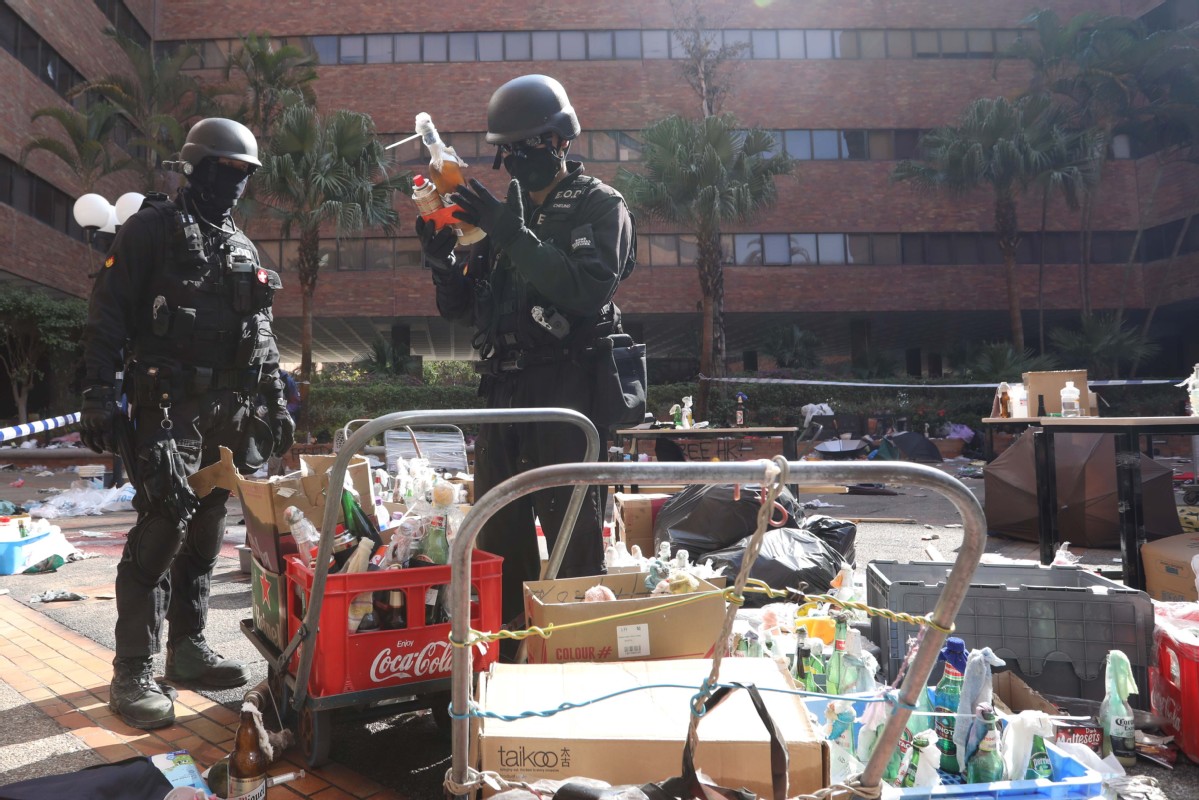China slams signing of HK bill
By MO JINGXI and ZHANG YANGFEI in Beijing, LI BINGCUN and HE SHUSI in Hong Kong | China Daily Global | Updated: 2019-11-29 08:46

Enactment by US condemned as bullying that aims to destroy prosperity and stability
China has strongly condemned the United States' signing into law of the Hong Kong Human Rights and Democracy Act of 2019.
US President Donald Trump signed the act into law on Wednesday despite China's strong opposition.
Beijing summoned Terry Branstad, the US ambassador to China, to protest the US move.
China's Foreign Ministry described the move as bullying. "Signing the bill into law severely meddles in Hong Kong affairs, severely interferes in China's internal matters and seriously violates international laws and basic norms governing international relations," the ministry said in a statement released on Thursday.
The intention of the US is very vicious, bolstering violent criminals who have damaged facilities, attacked innocent residents and trampled on the rule of law and social order, the ministry said.
"The fundamental purpose of the US side is to destroy Hong Kong's prosperity and stability, undermine the great practice of 'one country, two systems' and barricade the historical process of realizing the great rejuvenation of the Chinese nation," the ministry added.
It warned that China allows no interference from foreign governments or forces in Hong Kong affairs. It urged the US not to go its own way, or China will absolutely take resolute countermeasures and the US will bear all consequences.
In addition, the government of the Hong Kong Special Administrative Region and some government departments, such as the Hong Kong and Macao Affairs Office of the State Council, issued statements expressing strong opposition to Trump's signing of the bill.
Hong Kong's political heavyweights also denounced the US move on Thursday, saying it is a gross intervention in China's internal affairs.
Rita Fan Hsu Lai-tai, former president of Hong Kong's Legislative Council, said the US is using the law to threaten the SAR in such a way as to further threaten China politically and economically, since China's growth is seen as a threat by the US.
By threatening to remove its special treatment of Hong Kong-as well as supporting the city's rioters as if they were fighting for democracy and human rights-the US is trying to put the SAR's stability at risk and diminish its economic contribution to China to maintain its "economic supremacy" across the world, Fan said.
Tam Yiu-chung, a Hong Kong deputy to the Standing Committee of the National People's Congress, said that by enacting the law, the US is using Hong Kong as a pawn to contain China, which will bring no good to the city and increase its economic uncertainty.
He also blamed the role of Hong Kong's opposition in fueling the situation. Earlier, some opposition politicians went to the US to lobby for the bill.
At a news conference on Thursday, Martin Liao Cheung-kong, convener of pro-establishment lawmakers, said the formulating process for the bill was full of prejudice and against the principle of democracy and human rights.
Considering the close economic ties between Hong Kong and the US, the act will not only hurt the interest of Hong Kong people, but also the US, Liao said.
In a statement released on Thursday, the Hong Kong Federation of Trade Unions, the city's largest labor group, said US attempts to take advantage of the recent unrest and interfere with Hong Kong's internal affairs are unacceptable.
Saying the law will help fuel the unrest in Hong Kong, the federation urged the US to respect the "one country, two systems" principle and the high degree of autonomy of Hong Kong. US politicians should stop ruining Hong Kong's future by meddling with its affairs, the statement said.
Leung Chun-ying, a former chief executive of the HKSAR, said that whoever initiated the act, whether from the US or Hong Kong, never had the interests of Hong Kong in mind.
"I don't think the members of the US Congress who voted for the act were fully or correctly informed," Leung said. "It's a proxy thing. I don't think they had Hong Kong's freedoms, democracy and human rights in mind. It's all about China."
























